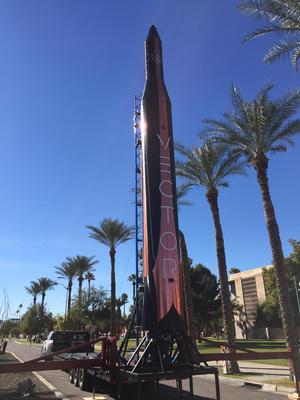Phantom Space Corp., a space transportation startup based in Tucson, announced that it has raised $5 million in seed funding in hopes of "revolutionizing space transportation" by making it accessible to more people.
The company is in its early stages, but it has four launch vehicle development units in place with plans to do its first orbital launch in the first quarter of 2023. The funding will be used to expand the Phantom team, which currently has 26 members, and the round was led by New York-based Chenel Capital.
Phantom Space also recently acquired StratSpace, a fellow Tucson company focused on building space systems. The company stated it has many government partnerships on its radar and that it is building imagery satellites for a commercial customer that will go on to support the U.S. Department of Defense.
"We are proud of our contrarian approach to building rockets and other space transportation technology," Phantom Space CEO and co-founder Jim Cantrell said in a statement. "We want to be the Henry Ford of the space industry with mass production while others in this space are focused on vertically integrating their technology and supply chain. At Phantom, to achieve rapid time to market and enabling mass manufacturing, we are leveraging mature supply chains in addition to our own innovations. This allows us to get to orbit faster than ever thought possible."

Cantrell was previously an early employee at SpaceX in California and more recently he had co-founded another space startup in Tucson called Vector Launch.
Vector Launch raised more than $90 million in venture capital from 2017 to 2018, before filing for Chapter 11 bankruptcy protection in 2019. Sequoia Capital, a series A investor in Vector Launch, pulled its funding which led to the bankruptcy filing, according to an Axios report at the time.
Finger-pointing ensued after the bankruptcy, with Cantrell and Vector board members disputing the cause of the company’s failure. In a bankruptcy filing, Vector Launch’s former CFO Stephanie Koster also sought monetary damages, alleging that she did not receive a severance agreement as did other top executives.
Lockheed Martin bought $4.25 million worth of Vector Launch’s intellectual property in March 2020 during the bankruptcy proceedings and court records show the bankruptcy plan was approved by a Delaware Court in January of this year.
Unlike Vector Launch, which attempted to build its own engines, Phantom Space will use engines produced by Denver-based Ursa Major Technologies.
New leadership has since taken over Vector Launch and the company had planned to remain in Tucson, according to the Arizona Daily Star. However, the company’s website and Twitter page now lists its location as Huntington Beach, California.
The original version of this article stated that Vector Launch’s former CFO Stephanie Koster had filed suit against the company over alleged discrimination claims. In fact, she filed a claim seeking monetary damages as part of the company's bankruptcy proceedings, alleging that she did not receive a severance agreement as did other top executives, but didn't file a separate suit against the company.









